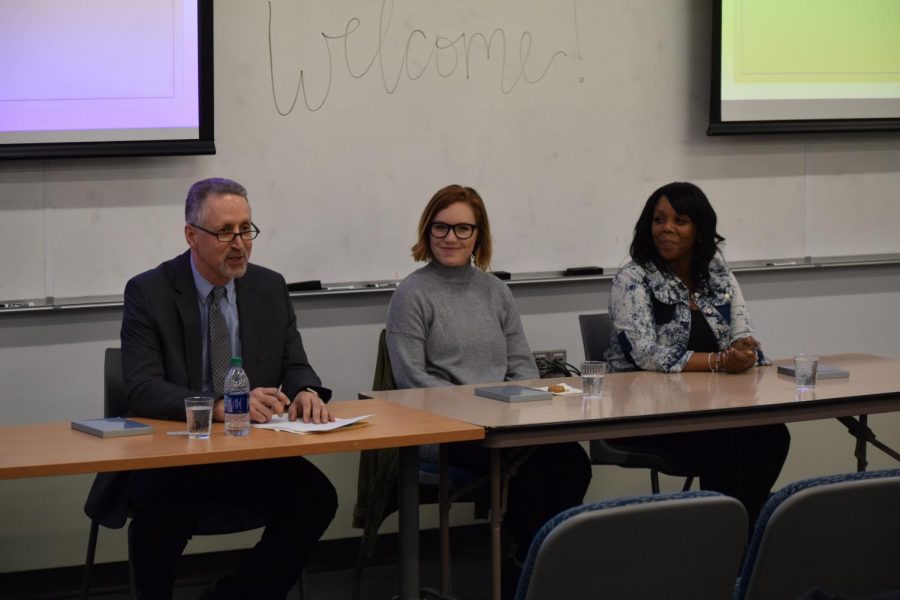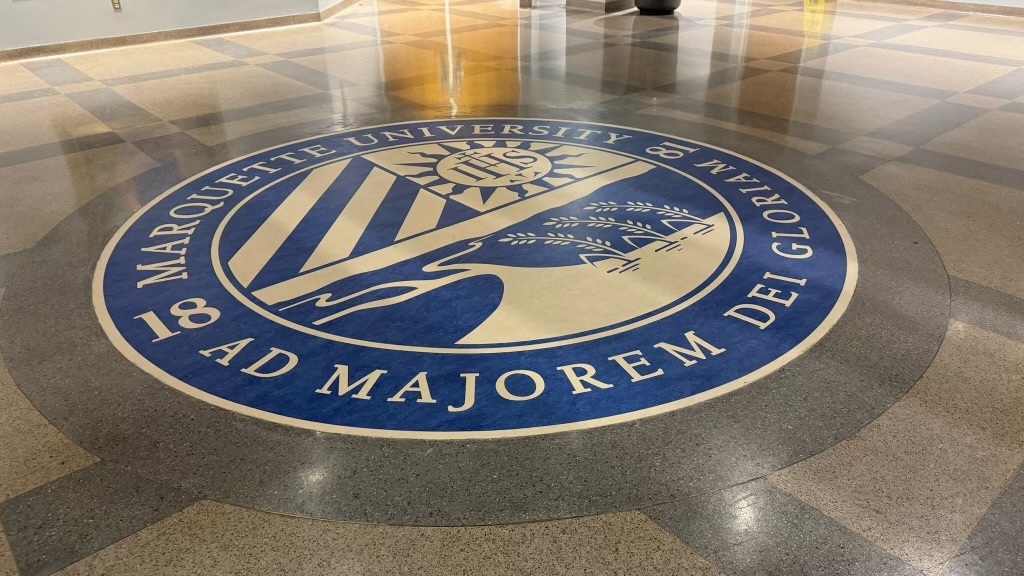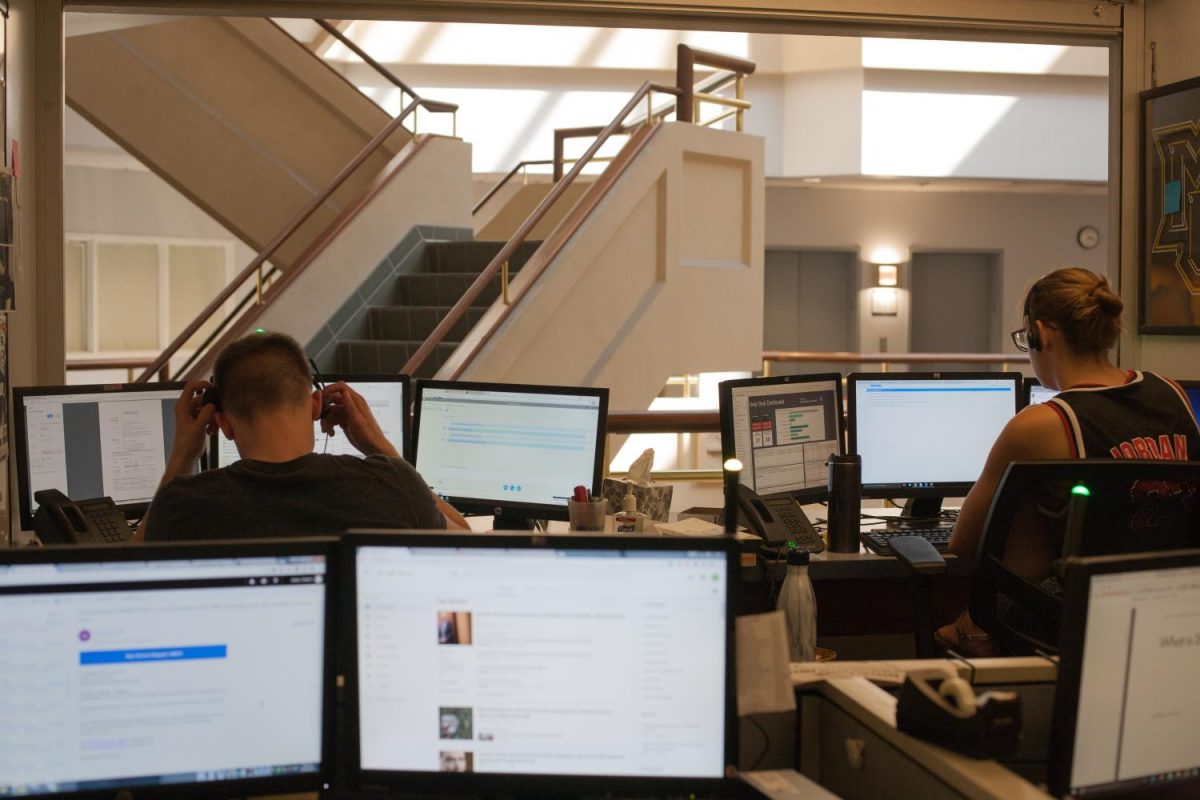April Bentley said the grace of God saved her the day she woke up in the middle of a human trafficking ring. It was the beginning of the end of her 19 years in the sex industry.
“One day, my life was flipped upside down,” Bentley said.
Bentley spoke about her story at the “Cookies and Conversations” event in Cudahy Hall Thursday at 7 p.m. Alongside her was Richard Friman, a Marquette professor who studies and researches human trafficking locally and globally, and Melania Klemowits, executive coordinator of Exploit No More, a human trafficking advocacy organization in Milwaukee.
The event was hosted by Sold Out, a Marquette student organization that advocates awareness for human trafficking, and a Marquette student sub-group of Catholic Relief Services, an “organization who works with local, national and international Catholic institutions and structures, as well as other organizations, to assist people on the basis of need, not creed, race or nationality”, according to the Catholic Relief Services website.
“My more recent work has focused more on questions of expanding the box of trafficking,” Friman said. “And that’s partially why we are here. Traditionally the discussion of human trafficking was primarily trafficking of foreign people into different countries, primarily for sex trafficking. Over time, the box has become larger.”
Friman said there has been an increased focus of labor trafficking, as well as looking at domestic trafficking.
“I think it’s easy to think about human trafficking as a far-off issue, but it is an issue here in Milwaukee,” Leah Jackson, a senior in the College of Communication and member of CRS, said. “It’s a privilege for us to get to sit in here and be educated on the issue that is right in our neighborhood.”
Klemowits said Exploit No More focuses on awareness and stopping the problem of trafficking before it begins.
“The uplifting part of trafficking is that when people know what to look for, we can prevent it,” Klemowits said. “By giving people the network, we can step out of it because we can say, ‘We have given you the tools to go and run with this and tell more people about trafficking.’”
Bentley was talked into the life of human trafficking when she was 14 years old by a 25-year-old woman whom she trusted. Bentley had become distant with her mother after her stepfather left. Bentley said her mother then turned to drugs.
“I was looking for that guidance,” Bentley said. “I was 14, I was smack dab in the middle of adulthood and childhood and from that place, the decisions that I made would follow me for the rest of my life.”
Bentley said she started to skip school and hang out with people who did nothing but “looked fun,” where she met the woman in the house where everyone hung out. The woman would embrace her and tell Bentley to call her “sister.”
“It was the best thing that had ever happened to me because I had never had a sister and she was really pretty,” Bentley said. “She was like a life-sized Barbie. She was that girl. When we were little all our Barbie dolls were so pretty, so to see one in real life was like, ‘Wow, I want to be like that.’”
Bentley said everything about this woman was “lady.”
“I didn’t have a lot of lady examples in my home, in my family. The women that were in my family were chicks, they were hardcore chicks,” Bentley said. “I thought this was it for me.”
Bentley started to hang out with the woman regularly, but what Bentley said she didn’t know was that the woman was fishing for information about Bentley and her family situation.
After about three months of hanging out with her, Bentley said the woman knew how vulnerable she was.
“She did the whole ‘gotcha’ kind of deal,” Bentley said.
One day, Bentley said she walked into the woman’s house and saw that the woman was crying on the floor about how she was going to lose her house and did not have enough money to pay for things. Bentley wanted to help, but at 14, she did not know how much she could do besides steal food from her mother’s home and give it to the woman.
But the woman had a different idea.
“She said, ‘You know the guy up the street who I go make breakfast for sometimes?’ And I said, ‘Yeah,’ and she said, ‘If you go and make breakfast, he’ll pay you $200,’” Bentley said.
Bentley thought it was a lot of money to make breakfast, just cooking eggs and bacon. She thought it was the only thing she had to do because that’s what the woman told her. Though Bentley said she felt uneasy, she went along with it.
“The woman said, ‘You trust me, don’t you?’ and I think those words … something just sat in me that said, ‘She had never given me a reason not to trust her,’” Bentley said.
After the woman dressed Bentley up in a miniskirt and red heels, the woman led her down the street to the house of a 45-year-old man.
Nothing that Bentley did to try to escape the situation, like crying and freezing in place, worked. The man paid Bentley the $200. Bentley gave the woman the money when she was finally allowed to go and told the woman everything that happened, who then told Bentley that “it would never happen again.”
“Speeding up, I lived 19 years in the place called ‘Out of my Mind.’ Nobody could do it in their sane mind, and if they tell you they’re doing it in their sane mind, they’re lying,” Bentley said.
Bentley said the Lord began to develop her and grow her.
“I was 14 for 19 years. Though I looked and had the experience and did a whole lot, I was still only a kid. I had no knowledge because I dropped out of high school – I had no knowledge about how things worked in the real world,” Bentley said. “But what I did do was I trusted God that we serve today to grow me up.”
Bentley, now married and with a son, is the founder of R.U.B.I.E.S., a corporation she started in 2016 to respond to the cry in the community to save girls from being targeted for sex trafficking in the Milwaukee County area, according to its website.
“R.U.B.I.E.S.’ mission is to reach at-risk girls through education and mentoring to prevent them from becoming victims of abuse sex trafficking while restoring those who have been affected by this trauma,” the site said.
Molly O’Malley, a sophomore in the College of Health Sciences, attended the event to learn more about the issue of sex trafficking.
“I learned a lot about how human trafficking relates to Milwaukee and how it’s an issue a lot closer to home,” O’Malley said.
“My goal is to connect and to continue growing so our girls in our communities are safe and that it is okay to be free, to be liberated, to be you without being a target, without being a victim,” Bentley said.





